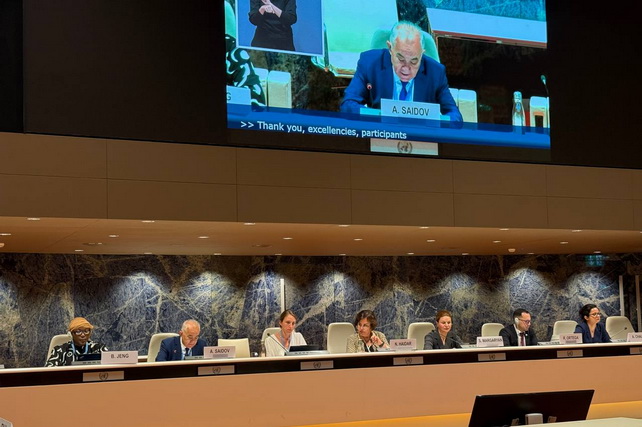
Uzbekistan Showcases Its Experience in Implementing National Human Rights Strategies in Geneva
Uzbekistan Showcases Its Experience in Implementing National Human Rights Strategies in Geneva
Tashkent, Uzbekistan (UzDaily.com) — On 30 June 2025, a high‑level international seminar was held in Geneva under the auspices of the Office of the United Nations High Commissioner for Human Rights (OHCHR), pursuant to Human Rights Council resolution 51/33. Among the presenters was the delegation from Uzbekistan, which shared its experience in establishing, operating and strengthening national mechanisms for human rights implementation, reporting and follow‑up.
The seminar, convened at the Palais des Nations, brought together representatives of UN member states, international organizations, national human rights institutions and experts. Participants examined strategies for the effective coordination of actions to fulfil international human rights obligations, implement recommendations of treaty bodies and those arising from the Universal Periodic Review (UPR). Special attention was paid to the achievement of the Sustainable Development Goals (SDGs), particularly the preparation of Voluntary National Reviews, and to enhancing national accountability and transparency.
In this context, the seminar participants welcomed the resolution initiated by President Shavkat Mirziyoyev at the 75th session of the UN General Assembly on “Strengthening the Role of Parliaments in Accelerating the Achievement of the Sustainable Development Goals.” They highlighted how this initiative underscores the importance of legislative bodies in advancing human rights and development objectives.
Ambassador Akmal Saidov, Director of the National Centre for Human Rights of the Republic of Uzbekistan and member of the UN Human Rights Committee, emphasized that the effectiveness of implementing international human rights obligations depends directly on the quality and institutional maturity of national coordination mechanisms. He presented Uzbekistan’s national model, which comprises the development and implementation of National Human Rights Strategies as a cornerstone of the country’s human rights policy. The first strategy, covering 2020–2025, was adopted in 2020 and marked a significant step in systematizing Uzbekistan’s efforts to meet its international commitments. The draft of the second National Human Rights Strategy for the period up to 2030 has now been completed.
Ambassador Saidov also described the establishment of a National Reporting and Follow‑Up Mechanism and the deployment of a digital platform—the National Recommendations Tracking Database (NRTD)—which enables real‑time monitoring of the implementation of international obligations. He stressed the active engagement of the parliament and civil society institutions in shaping and overseeing human rights policy.
Seminar participants praised Uzbekistan’s approach to formulating and executing its national strategies, noting that the Uzbek model offers valuable guidance for other states seeking to reinforce their human rights infrastructure. Expert meetings and panel sessions further explored ways to integrate human rights themes into educational curricula, enhance the professional development of human rights specialists and strengthen the role of academic and research institutions in this field.
In closing, the seminar delegates underscored the need to sustain the dialogue, foster the exchange of knowledge and establish a platform for cooperation among national mechanisms. Proposals were put forward to hold regional forums—including in Central Asia—and to expand the virtual knowledge hub being developed with OHCHR support.
Uzbekistan’s active participation in the seminar demonstrates the country’s readiness to engage in global human rights processes, share its lessons learned and contribute to the strengthening of the international human rights system.